 |
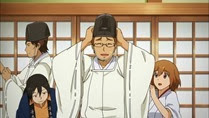 |
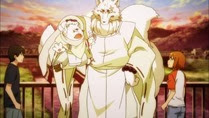 |
That was the simple and profound ending that Gingitsune richly deserved.
I was deeply moved by the last moments of this episode, and when a show can do that to me without anything overtly emotional happening, I know the writing is top-notch. It’s obvious enough why someone might be moved by Episode 11 of Refrain, or the ending of Kaguyahime – and those are wonderful anime. But there’s no tragedy here, no imminent parting – only the pure emotion of the moment itself. And that, for me, is the essence of why this little series quietly became one of the best of the season.
I’ve been trying to come up with a way to relate Gingitsune to Natsume Yuujinchou, a series with which is shares much, yet remains distinct from. What it comes down to for me is this – Natsume and Gingitsune are both going to the same place, but take different routes to get there. Gingitsune started out very much in Natsume Yuujinchou’s shadow for me, but over the course of these 12 episodes I’ve come to realize that this series has an identity very much its own, that relies on nothing for its charm but its own emotional honesty and profound cultural awareness.
To say this show is a master of understatement is selling it short. This, truly, it what slice-of-life should be – of course things are happening all the time, but there doesn’t have to be a reason for everything that does. That, of course, is how life is – and what should slice-of-life be, if not a reflection of what daily life feels like? When a new character is introduced, he doesn’t have to serve an essential plot function – she can simply be there to enrich the tapestry of perspectives that make up the series. Everyone in Gingitsune is there simply for the sake of being there, because they’re part of the fabric of the world.
That’s why Gingitsune doesn’t feel the need to offer explanations of what everyone is feeling at every single moment. It trusts the audience to understand, because even if the circumstances might seem exotic or fantastic at times these are people just like us. We know them, because we know people just like them. They react the same way as we would most of the time. One of the remarkable things about Gingitsune is the way it manages to be both one of the most distinctly Japanese anime in years – it may be the best anime about Shinto this decade – and thoroughly universal. I’ve never attended a cleansing ceremony at a Shinto Shrine before, but I recognized every moment of these last two episodes because I’ve experienced family gatherings around holidays countless times.
I think choosing the Nagoshi-no-Harae to end on was perfect for Gingitsune, because it offered both an opportunity to explore a fascinating and beautiful Shinto tradition and an insight on the role of Jinja in knitting communities together. Before the modern age of Shinkansens and airplanes, when any journey was a time-consuming and dangerous one, Matsuri at the local Shrine were the primary avenue for social gatherings, playing a crucial role in uniting an area. Now of course it’s an opportunity to snap photos and get a taste of the distant past, but as we see here these festivals are still an occasion to gather people together – to remind them both of their shared past and of their shared feelings for each other (this is what finally gives Makoto the inspiration to see her wish for the future). They perform an important spiritual function too, for believers in the faith, but as Gintarou says what really matters in the human world is possibility. This is a sharp difference between Shinto and more rigidly organized religions, to be sure.
It was interesting that the series chose to keep the activities of Gintarou and Haru during the cleansing ceremony behind a curtain of mystery. Did he talk to Uka-no-Mitami? “Sort of.” Gin says – and as with so much else in this series, no need is felt to explain. It’s not the role of humans to understand the ways of Kami – and in this sense Gingitsune is quite different indeed from Natsume Yuujinchou, which on many occasions demystified the lives of Gods. Despite the presence of the Heralds in the lives of those who have the Sight, this series is much more about faith and embracing the mysteries of the universe. Natsume is all about humans and those from the other world directly impacting each other, Gingitsune much more about the role our belief in them plays in our lives.
There were wonderful moments in the finale, like the brief appearance of “Grin-tarou” and the Katashirou blowing up from the river’s surface and briefly touching Makoto before disappearing into the Heavens (again – no explanation is offered because none is needed). Mostly, though, this isn’t about individual events so much as the overall experience – both for the characters and the viewers. It’s enough to be with Makato and Satoru as they and their Heralds muse on the cruel but merciless nature of time, and the desire to always be together. We know this desire can’t be granted – it’s only the privilege of the very young to believe it can – but the desire itself is the point. What matters is that Makoto wishes she could stay with Gin forever, and that he’ll stay with her all the days of her life. Beyond that all anyone can do is surrender themselves to the uncertainty of the Universe – as Gintarou says, it’s all about possibility.
My lasting memories of Gingitsune will be less about individual moments than of the way it made me feel – the great ease with which I was able to lose myself in its embrace every week. In a series without much flash, it’s certainly Miki Shinichirou’s sublime performance as Gintarou that shines brightest – he’s truly spectacular here. But this is a rock-solid work from top to bottom, with a great sense of itself and wonderful and deep cast. Makoto provided the center of gravity and it was through her eyes that we experienced much of Gingitsune, but it was with the arrival of Satoru that the series began to realize its full potential. With him came Haru, who provided a foil for Gin and a good deal of charm in her own right, and an array of characters who each cast a shadow larger than their brief appearances would have allowed in a lesser series. And then there was Tatsuo, who – behind another great performance, this one by Seki Toshihiko – provided an anchor of humility and decency and provided a living example both of what a father and a spiritual leader in a community should aspire to be (and stole Hiwako’s heart in the process).
It’s sad to see a series as lovely as Gingitsune come to an end so quickly – endings are the worst thing about great anime, as I said last week with Kyousougiga. But this series (as that one did) behaved as if it knew exactly what it wanted to be, and seems to have been expressly laid out to tell its story fully in one cour. There’s no hesitancy or uncertainty in this ending because the point is resolutely made – we’ve come to know this world and these characters, and received loud-and-clear the message of acceptance and optimism that the series set out to deliver. If the goal of any anime is to succeed on its own terms, than Gingitsune has been an unqualified success. And that, for me, is a far greater measure of worth than the number of Blu-rays a series manages to sell.
 |
 |
 |
 |
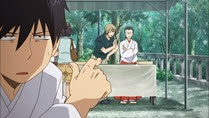 |
 |
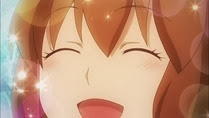 |
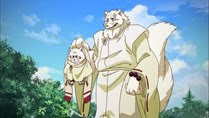 |
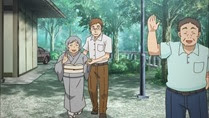 |
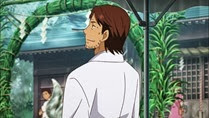 |
 |
 |
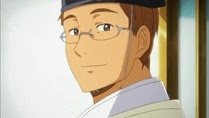 |
 |
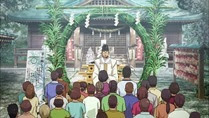 |
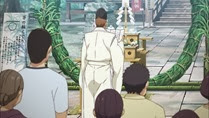 |
 |
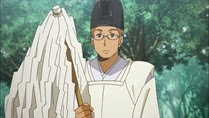 |
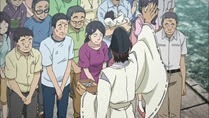 |
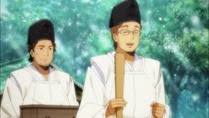 |
 |
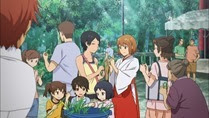 |
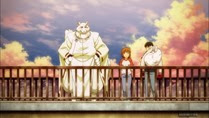 |
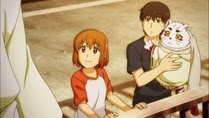 |
 |
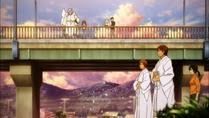 |
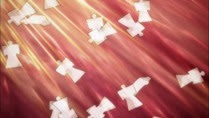 |
 |
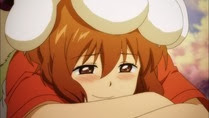 |
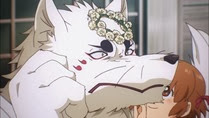 |
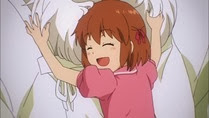 |
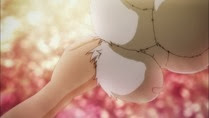 |
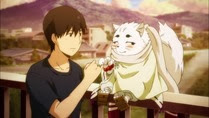 |
 |
 |
 |
 |
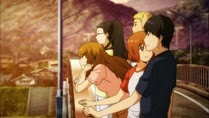 |
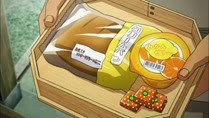 |
 |
 |
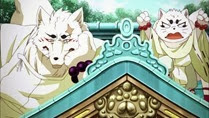 |



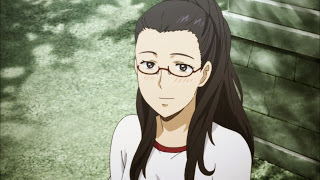
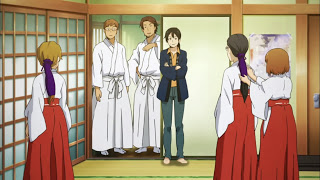
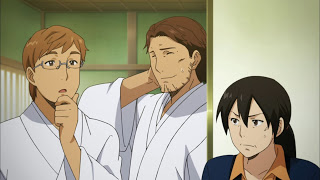
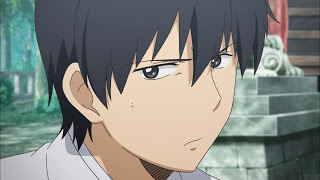
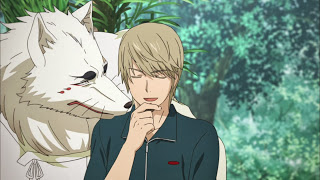
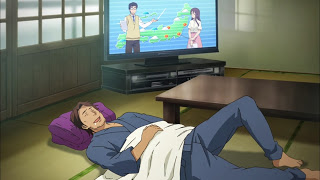
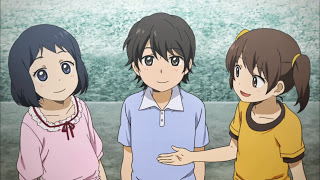
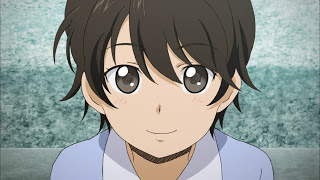
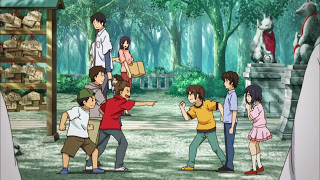
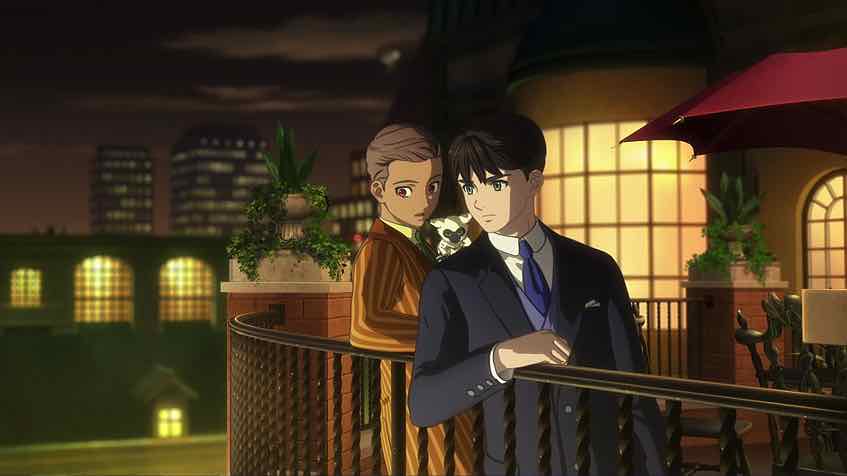
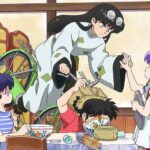
thedarktower
December 23, 2013 at 2:10 pmGingitsune ;-;
as you've constantly said "it's either works for you or not". that was gingitsune from the very beginning. for some it's boring, for me..well that's my cup of tea (:
Gingitsune is a great SoL series. moreover, I like how it never tried to enhance drama feels too much. what you get on the screen, that's what there is.
we had many cases of flashback or related stuff of characters like Gin, Satoru, Haru,Hiwako. but they don't dig up too much. same as for Makoto's case as presented the last 2 eps.
same goes for some "romantic" development. there isn't much of it. what you get on the screen is what there is. and it was sufficient and efficient for me. I am glad they didn't dig up too much within the love-complex. it was part of Gingitsune charm.
if I need to describe Gingitsune…I'll use the word magical. that's what the series was for me.
and the last episode certainly proved it. I enjoyed every second of this episode. it was the greatest of all Gingitsune episode. all characters were present and interacted in the way we had throughout the entire season.
those moments of the festival, the "official ceremony", the Katashirou..it was all great. conveyed so relaxing and enjoyment feeling. as almost as I was there.
I also like how Gingitsune is dealing with the fantasy element. there's a separation but not completely.
one important thing is that "divine power" mostly is concealed. you can't grant miracles like that to anyone or see the heralds and all. that's a common belief in religion – that divine power is almost as one with the Nature. and Gingitsune did that all along. and Gin didn't reveal much about the Gods or what they were discussing about. some things are better remain in the fantasy side. it demonstrates how great Gingitsune is treating the fantasy element within it.
thank you very much for blogging this series! Iam very happy you blogged this one and I enjoyed reading your posts!
one of the lovely surprises this season and this year.
admin
December 23, 2013 at 2:14 pmYou're very welcome. It was a wonderful series to watch, and became much easier to blog as it went along.
Flower
December 23, 2013 at 2:26 pmAn excellent summary (and perhaps even "tribute") to this beautiful series.
Thank you again for choosing to blog it! ^^
Sylpher
December 23, 2013 at 10:00 pmI wish I would have liked this series a lot more.
Gingitsune certainly succeeded on its own terms by being a pure slice-of-life with fantasy elements and that’s exactly the main problem I have with this low-key show. Sure, it was soothing, sometimes heartwarming, and definitely insightful on Shinto and animism, but it wasn’t particularly interesting or compelling. The episodic structure, the lack of conflict, purpose and development i.e. significance made this show quite boring to watch at times. It showed some real potential by introducing Satoru and his heartbreaking background story, but unfortunately didn’t do much more with it.
Overall I still liked it, but if I didn’t follow this show, I don’t think I would have missed out on anything worthwhile.
Salary Dam
December 24, 2013 at 6:03 amGingitsune is one of those shows which I feel like I can rewatch over and over again because watching it truly is a relaxing experience. I also really, really like the flying Katashirou scene. Magical; and wonderful indeed.
Thanks for blogging Gingitsune!
Flaiboy
December 27, 2013 at 5:51 amI liked Gingitsune because it treated the characters' problems in a realistic fashion. Rarely do my struggles fully resolve and if they do it's never in an instant. Unlike many shows this one exhibits maturity in depicting a character's struggles (take Satoru, for instance) where conflict resolution is a work in progress and not a quick fix. They make progress but continue to do so among the emotional debris such growth produces. They're better off, but we know they've still got some work to do.